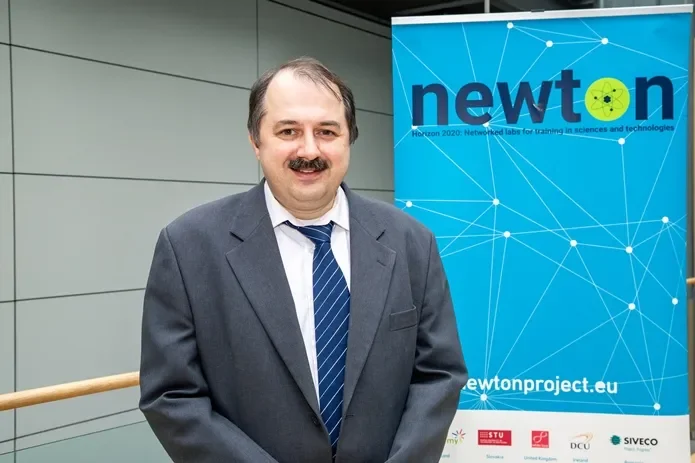

NEWTON: New ways to engage students in science, technology, engineering and maths
This week’s Spotlight on Research is with Dr Gabriel-Miro Muntean, Associate Professor at DCU School of Electronic Engineering and Co-ordinator of the European Horizon 2020 NEWTON Project.
You head up a project called NEWTON, what is that about?
“NEWTON is a big European project that looks at how we can use technology to help students learn about science, technology, engineering and maths, or STEM as it is sometimes known. We are just about half-way through the three-year project, it is funded by the EU Horizon 2020 programme and it involves 14 academic and industry project partners from around Europe. DCU is the co-ordinator.”
What kind of approaches are you taking?
“We are designing different, innovative types of technology, deploying and testing them out in learning environments to see whether and how they can help students to engage more with STEM subjects right across primary and secondary schools, university and vocational institutions.
Some of the approaches target senses other than the classic sight and sound, they target touch and smell. Others use personalisation and are designed to deliver the information at the right level to the individual learner based on their knowledge level. Finally, others use gamification, rewarding learners by offering them points and badges during their educational experience.”
Lots of projects are using technology to deliver learning, how is NEWTON different?
“In NEWTON, the new technologies are deployed under the same umbrella – there is a newly built common platform called NEWTELP, which allows educational content to be stored and delivered to learners using these new technologies.
We are gathering and comparing evidence about the benefits of using these types of technology from different points of view, including learning outcome and student satisfaction.”
What are you working at the moment?
“We have a number of short- and long-term pilots we are delivering in real classrooms. One of the short-term projects is NEWTON FabLab, where students can make use of ‘fabrication’ technologies such as 3D printing and laser cutting.
Many of these technologies are not feasible to have in schools, as they are too expensive to maintain. So, we have set up a collaboration with our CEU Madrid NEWTON project partner, which designed, implemented and deployed a ‘remote’ FabLab. In practice, the students design what they want to make, then they send designs away to be made in a fabrication facility using this remote FabLab solution.
We have recently done this with St Pat’s Boys School in Drumcondra. The children designed vases in Dublin, the designs were sent using the NEWTON technology to Spain, the objects were printed there in 3D and were returned to the students by mail. The students got to learn about design and fabrication technology, and the school did not need to invest heavily in terms of resources for that to happen.”
What about the longer-term pilots?
“We are running an eight-week ‘Earth Course’ with two schools in Dublin, where the students will learn about astronomy, biology and geography. We use games in this one. There is one called Final Frontier, designed by the NCI NEWTON team, where the student learns about the Solar System by controlling an avatar, taking a journey in a spaceship and having fun. They collect meteors and use jet packs while they learn about the different gravitational forces and atmospheres of planets, and they get points along the way.
In other games generated by the SIVECO NEWTON team, the students are in the wilderness and they are meeting animals and learning about them, or in the sea swimming with sea creatures and interacting with them. Our project will assess whether this increases engagement with the learning.
We are also running a 12-week “Programming” pilot in DCU and NCI, offering more than 150 first-year students the possibility to learn a difficult subject using innovative technologies and methods including game-based learning, adaptive multimedia content delivery and project-based learning.”
What do you hope the project will achieve?
“Overall, we are hoping that by making learning more interactive and personalised, students will be more attracted to STEM subjects, that they will stick with them and more will go on to study them at third level and eventually become the science specialists our society needs.”
What does your day-to-day work involve?
I love doing research, my area of expertise is multimedia networking and I design solutions to send multimedia content to viewers across different types of networks, so they have the best quality of experience.
Thanks to the NEWTON project I am expanding my expertise into novel areas such as gamification, multi-sensory media and technology enhanced learning.
I co-ordinate the research in the 10-person DCU Performance Engineering Lab, I teach and meet with students and I supervise final-year and Masters projects.
I have also become an expert in admin: I deal with finance and HR, with other partners on the NEWTON project and with the European Commission. I spend a lot of time balancing things, finding solutions and applying for competitive funding.”
What do you do to relax or take time away from the research?
“I am really busy with the NEWTON project and research, so even when I go for a walk I am thinking about my to-do list. However, my favourite thing to do is to spend time with my kids – Daniel is 10 and Alexandra is six now and they are growing so fast. I really enjoy being with them and we had great fun in the snow recently. When I get the chance too I enjoy reading science fiction books.”
